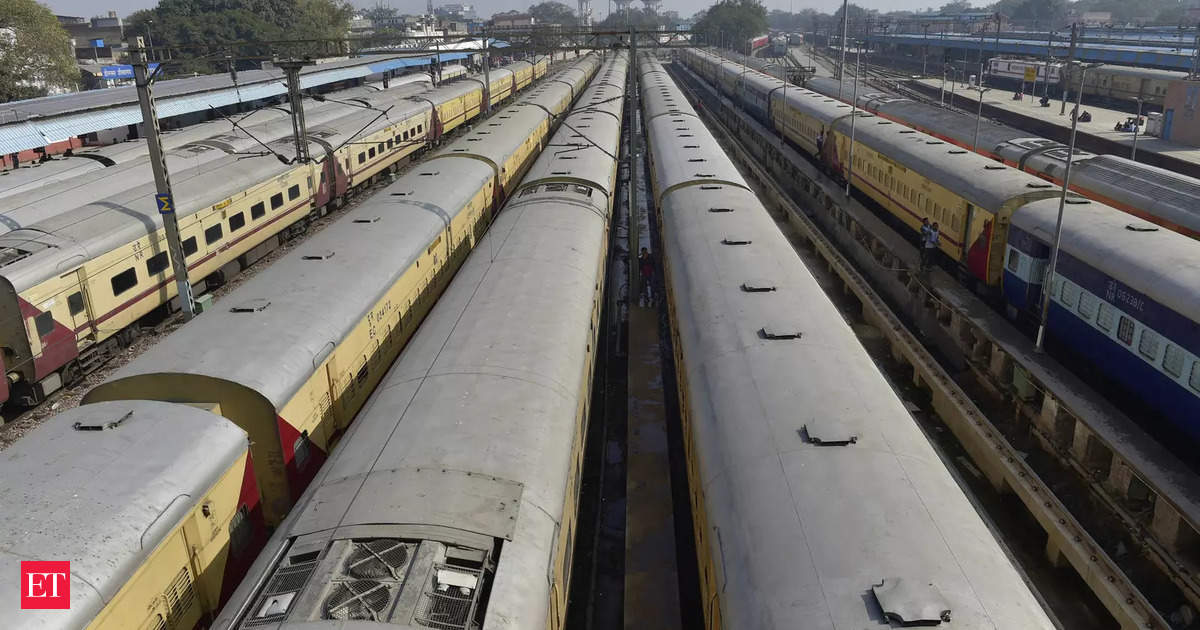The report, titled “Challenges faced by section controllers in carrying out their duties effectively”, aims to explore improvements in the selection procedure, training and infrastructure to improve the efficiency and effectiveness of railway operations.
He Indian Railways It is one of the largest networks in the world, with thousands of trains running daily on various sections of nearly 105,555 km of track, according to the report. “This gigantic activity is controlled by 68 operations centres on the IR network called Divisional Control Office.”
The Divisional Control Office, located at the divisional headquarters, plays a vital role in the overall functioning of the railway network, tt says.
The railway network of a division is subdivided into sections consisting of several stations. “Trains running on these sections are controlled and monitored by section controllers who work round the clock in shifts at the control board.”
The RDSO team collected data from various divisional control offices and found that there are Vacancies The report states that vacancies in the management cadre ultimately affect the working conditions of regular staff. Under strenuous conditions, the quality of work also suffers. Management also faces difficulties in managing staff time off and holidays. Therefore, vacancies in the management cadre must be analysed as a matter of priority and efforts must be made to fill them. Section controllers work 24 hours a day, 7 days a week and their shifts cannot be left unstaffed.
“According to the roaster, the section controller requires 30 hours of weekly rest. But, due to the lack of adequate staff, management sometimes has problems organizing weekly rest or leave for section controllers. In a continuous work schedule, they feel exhausted and their productivity suffers,” the report adds.
Identifying the reasons for the shortage of section controllers, the report notes that 75 per cent of the posts are filled through selection from the feeder cadre of station masters (55 per cent), train managers (10 per cent) and train clerks (10 per cent).
“The initial salary of section controllers has been made identical to the grade salary of station heads (L/6) in the VII CPC. Whereas, earlier, the initial salary of section controllers was one grade higher (L/6) than the salary of station heads (L/5) and hence, station heads were interested in applying for the post,” the study said.
“However, in the current selection process, the SM category is reluctant to apply for the position of Section Controller due to the lack of substantial financial benefits. This situation has led to a staff shortage in the Section Controller cadre, which has resulted in increased pressure on the Section Controller workforce,” he added.
Expressing concern about the current practice of bringing “medically declassified” personnel into the control department as section controllers, the study says: “A person with any medical condition or disability will have some restrictive working condition that will prevent him or her from meeting the demands of the job.”
The study has suggested several measures, such as upgrading the initial pay scale from grade 4,200 to grade 4,600 to make it more attractive for food grade candidates, introducing an aptitude test in recruitment/selection and extending the duration of the training period.
The team also suggested that the Railway Board reintroduce direct recruitment of section controllers through the Railway Recruitment Board, which was discontinued in 2020.
He also said that no controller should be allowed to work without undergoing regular refresher training, the study said.
“Increasing the frequency of refresher courses will also enable section controllers to frequently update their knowledge and skills. This frequency may increase from once every three years to once a year, as in the case of air traffic controllers,” he added.
The study also found that basic amenities such as water purifiers, tea and coffee vending machines and toilets were not available in Section Control offices, which it recommended.
“During interaction with section controllers regarding their health issues, it was revealed that majority of section controllers suffer from various lifestyle related disorders such as blood pressure, diabetes or heart diseases. This is a matter of concern for an employer. Therefore, periodic medical examination (PME) is recommended for this category, which will improve their physical well-being,” the study says.
He added: “As the work is strenuous in nature, yoga, meditation or other specialised mitigation programmes can also be organised to promote their well-being.”
Disclaimer:
The information contained in this post is for general information purposes only. We make no representations or warranties of any kind, express or implied, about the completeness, accuracy, reliability, suitability or availability with respect to the website or the information, products, services, or related graphics contained on the post for any purpose.
We respect the intellectual property rights of content creators. If you are the owner of any material featured on our website and have concerns about its use, please contact us. We are committed to addressing any copyright issues promptly and will remove any material within 2 days of receiving a request from the rightful owner.

